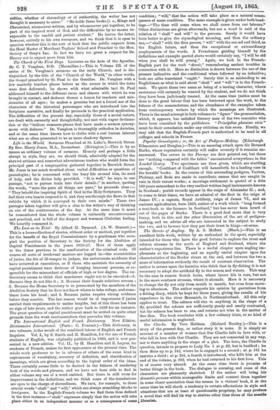The International English and French Dictionary. New Edition. Dictionnaire International.
(Paris : C. Fourant.)—This dictionary, in two volumes, is the result of the combined labour of English and French linguists. Vol. I., by S. Smith and H. Hamilton, for the use of French students of English, was originally published in 1860, and is now pre- sented in a new edition. Vol. H., by H. Hamilton and E. Legros, for students of French, makes its first appearance at the present time. The whole work professes to be in advance of others of the same kind in copiousness of vocabulary, accuracy of definition, and classification of meanings, which are given according to the logical order of the ideas. There certainly seems little to be desired in the fulness of rendering both of the words and phrases, and we have not been able to find in either volume any use of a word omitted. But there is still room for improvement in the definitions, and we think some of the translations are open to the charge of slovenliness. We turn, for example, to those crucial words "shall" and "will," which are always stumbling-blocks to foreigners. In the English-French volume we find them thus defined in the first instance—" shall" expresses simply that the action will take place either in an independent manner or as a consequent* of some "will" that the action will take place as a natural conse- quence of some condition. The same example is given under both head- ings—" The time will come when we shall cease from our labours." Other distinctions are given afterwards, but not a word is said of the relation of " shall " and will" to the persons. Surely it would have been better to give the etymological meaning, and then the orcliniry use,—" shall" with the first person, "will" with the second and third, as the English future, and then the exceptional or extraordinary employments of the words. A Frenchman guiding himself by the definitions and example quoted above would certainly say, "I will be old when you shall be still young." Again, we look in the French- English part for the verb "devoir," remembering ancient troubles in connection with it. Here no distinction is drawn between the use of the present indicative and the conditional when followed by an infinitive; both are alike translated "ought." Surely thiri is as misleading to an Englishman as what is said about " shall " and "will" is to the French- man. We quote these two cases as being of a testing character, where assistance will certainly be wanted by the student, and we do not think they have been judiciously treated. At the same time justice must be done to the great labour that has been bestowed upon the work, to the fulness of the nomenclature, and the abundance of the examples taken from contemporary writers by which the meanings are illustrated. There is the usual attempt in both volumes to " figure " the pronunciation, which, it appears, has satisfied literary men of the two countries who have been consulted by the publishers. " Principihus placuisse
must be their consolation under any criticism on this score. Finally, we may add that the English-French part is authorized to be used in all colleges and schools in France.






























 Previous page
Previous page